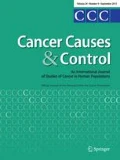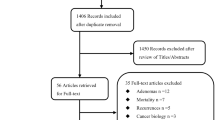Abstract
Purpose
Recently, some studies have shown that diabetes mellitus and metabolic syndrome increase the risk of colorectal neoplasms. Although the mechanism is not known, those have been proposed to contribute to this phenomenon, including insulin resistance, oxidative stress, and adipokine production. The objective of this study was to assess the association between metabolic risk factors and colorectal neoplasm.
Methods
Study participants visited the National Cancer Center, Korea, for screening (2007–2009). A total of 1,771 diagnosed adenoma patients and 4,667 polyp-free controls were included. The association between risk factors and colorectal neoplasm was evaluated using logistic regression models.
Results
High waist circumference, blood pressure, and serum triglyceride levels were associated with an increased risk of colorectal adenoma. Metabolic syndrome (MS) was associated with an increased risk of adenoma (OR = 1.44, 95 % CI = 1.23–1.70). The association between MS and colorectal adenoma was observed regardless of advanced/low-risk adenoma, and multiplicity. MS affected right colon adenomas (OR = 1.50, 95 % CI = 1.22–1.85), left colon adenomas (OR = 1.36, 95 % CI = 1.05–1.76), and adenomas in multiple anatomical locations (OR = 1.59, 95 % CI = 1.19–2.12), but was not associated with rectum.
Conclusion
Central obesity, triglyceride level, and MS are risk factors for colorectal adenoma including advanced adenoma and multiplicity.

Similar content being viewed by others
References
Parkin DM, Bray F, Ferlay J, Pisani P (2005) Global cancer statistics, 2002. CA Cancer J Clin 55:74–108
Jung KW, Park S, Kong HJ et al (2010) Cancer statistics in Korea: incidence, mortality and survival in 2006–2007. J Korean Med Sci 25:1113–1121
Vogelstein B, Fearon ER, Hamilton SR et al (1988) Genetic alterations during colorectal-tumor development. N Engl J Med 319:525–532
Winawer SJ, Zauber AG, Ho MN et al (1993) Prevention of colorectal cancer by colonoscopic polypectomy. The National Polyp Study Workgroup. N Engl J Med 329:1977–1981
Lieberman DA, Weiss DG, Bond JH, Ahnen DJ, Garewal H, Chejfec G (2000) Use of colonoscopy to screen asymptomatic adults for colorectal cancer. Veterans Affairs Cooperative Study Group 380. N Engl J Med 343:162–168
Chiu HM, Lin JT, Shun CT et al (2007) Association of metabolic syndrome with proximal and synchronous colorectal neoplasm. Clin Gastroenterol Hepatol 5:221–229
Limburg PJ, Anderson KE, Johnson TW et al (2005) Diabetes mellitus and subsite-specific colorectal cancer risks in the Iowa Women’s Health Study. Cancer Epidemiol Biomarkers Prev 14:133–137
Slattery ML, Benson J, Berry TD et al (1997) Dietary sugar and colon cancer. Cancer Epidemiol Biomarkers Prev 6:677–685
Khandwala HM, McCutcheon IE, Flyvbjerg A, Friend KE (2000) The effects of insulin-like growth factors on tumorigenesis and neoplastic growth. Endocr Rev 21:215–244
Prisco M, Romano G, Peruzzi F, Valentinis B, Baserga R (1999) Insulin and IGF-I receptors signaling in protection from apoptosis. Horm Metab Res 31:80–89
Ma J, Pollak MN, Giovannucci E et al (1999) Prospective study of colorectal cancer risk in men and plasma levels of insulin-like growth factor (IGF)-I and IGF-binding protein-3. J Natl Cancer Inst 91:620–625
Ahmed RL, Schmitz KH, Anderson KE, Rosamond WD, Folsom AR (2006) The metabolic syndrome and risk of incident colorectal cancer. Cancer 107:28–36
Murphy TK, Calle EE, Rodriguez C, Kahn HS, Thun MJ (2000) Body mass index and colon cancer mortality in a large prospective study. Am J Epidemiol 152:847–854
Wang YY, Lin SY, Lai WA, Liu PH, Sheu WH (2005) Association between adenomas of rectosigmoid colon and metabolic syndrome features in a Chinese population. J Gastroenterol Hepatol 20:1410–1415
Morita T, Tabata S, Mineshita M, Mizoue T, Moore MA, Kono S (2005) The metabolic syndrome is associated with increased risk of colorectal adenoma development: the Self-Defense Forces health study. Asian Pac J Cancer Prev 6:485–489
Kim JH, Lim YJ, Kim YH et al (2007) Is metabolic syndrome a risk factor for colorectal adenoma? Cancer Epidemiol Biomarkers Prev 16:1543–1546
Bowers K, Albanes D, Limburg P et al (2006) A prospective study of anthropometric and clinical measurements associated with insulin resistance syndrome and colorectal cancer in male smokers. Am J Epidemiol 164:652–664
Nam SY, Kim BC, Han KS et al (2010) Abdominal visceral adipose tissue predicts risk of colorectal adenoma in both sexes. Clin Gastroenterol Hepatol 8(443–50):e1–e2
Pelucchi C, Negri E, Talamini R et al (2010) Metabolic syndrome is associated with colorectal cancer in men. Eur J Cancer 46:1866–1872
Shin A, Hong CW, Sohn DK, et al (2011) Associations of cigarette smoking and alcohol consumption with advanced or multiple colorectal adenoma risks: a colonoscopy-based case-control study in Korea. Am J Epidemiol 174:552–562
Dixon MF (2002) Gastrointestinal epithelial neoplasia: Vienna revisited. Gut 51:130–131
Hamilton SR, Aaltonen LA (2000) Pathology and genetics of tumours of the digestive system. IARC Press/Oxford University Press, Lyon/Oxford [distributor]
Morois S, Mesrine S, Besemer F, Josset M, Clavel-Chapelon F, Boutron-Ruault MC (2011) Risks of colon and rectal adenomas are differentially associated with anthropometry throughout life: the French E3N prospective cohort. Int J Epidemiol 40:1269–1279
Morois S, Mesrine S, Josset M, Clavel-Chapelon F, Boutron-Ruault MC (2010) Anthropometric factors in adulthood and risk of colorectal adenomas: The French E3N-EPIC prospective cohort. Am J Epidemiol 172:1166–1180
Region W (2000) IASO and IOTF: the Asia-Pacific perspective: redefining obesity and its treatment. Health Communications Australia Pty Limit., Sydney
Ramachandran A, Snehalatha C, Satyavani K, Sivasankari S, Vijay V (2003) Metabolic syndrome in urban Asian Indian adults—a population study using modified ATP III criteria. Diabetes Res Clin Pract 60:199–204
Liu CS, Hsu HS, Li CI et al (2010) Central obesity and atherogenic dyslipidemia in metabolic syndrome are associated with increased risk for colorectal adenoma in a Chinese population. BMC Gastroenterol 10:51
Tsilidis KK, Brancati FL, Pollak MN et al (2010) Metabolic syndrome components and colorectal adenoma in the CLUE II cohort. Cancer Causes Control 21:1–10
Frezza EE, Wachtel MS, Chiriva-Internati M (2006) Influence of obesity on the risk of developing colon cancer. Gut 55:285–291
Gunter MJ, Hoover DR, Yu H et al (2008) Insulin, insulin-like growth factor-I, endogenous estradiol, and risk of colorectal cancer in postmenopausal women. Cancer Res 68:329–337
Giorgino F, Laviola L, Eriksson JW (2005) Regional differences of insulin action in adipose tissue: insights from in vivo and in vitro studies. Acta Physiol Scand 183:13–30
Cowey S, Hardy RW (2006) The metabolic syndrome: a high-risk state for cancer? Am J Pathol 169:1505–1522
Trayhurn P, Beattie JH (2001) Physiological role of adipose tissue: white adipose tissue as an endocrine and secretory organ. Proc Nutr Soc 60:329–339
Trayhurn P, Wood IS (2004) Adipokines: inflammation and the pleiotropic role of white adipose tissue. Br J Nutr 92:347–355
Pais R, Silaghi H, Silaghi AC, Rusu ML, Dumitrascu DL (2009) Metabolic syndrome and risk of subsequent colorectal cancer. World J Gastroenterol 15:5141–5148
Park HS, Kim SM, Lee JS et al (2007) Prevalence and trends of metabolic syndrome in Korea: Korean National Health and Nutrition Survey 1998–2001. Diabetes Obes Metab 9:50–58
Choe JW, Chang HS, Yang SK et al (2007) Screening colonoscopy in asymptomatic average-risk Koreans: analysis in relation to age and sex. J Gastroenterol Hepatol 22:1003–1008
Chung SJ, Kim YS, Yang SY et al (2010) Prevalence and risk of colorectal adenoma in asymptomatic Koreans aged 40–49 years undergoing screening colonoscopy. J Gastroenterol Hepatol 25:519–525
Acknowledgments
This study was supported in part by grants NCC-0910160 (H. J. C), NCC-0710360 (C. W. H), and NCC-0910220 (A. S) from the National Cancer Center, Korea. The authors thank Jeong-Hee Lee, MS for her help in manuscript preparation.
Conflicts of interest
None declared.
Author information
Authors and Affiliations
Corresponding author
Additional information
Byung Chang Kim and Aesun Shin have contributed equally to this work.
Electronic supplementary material
Below is the link to the electronic supplementary material.
Rights and permissions
About this article
Cite this article
Kim, B.C., Shin, A., Hong, C.W. et al. Association of colorectal adenoma with components of metabolic syndrome. Cancer Causes Control 23, 727–735 (2012). https://doi.org/10.1007/s10552-012-9942-9
Received:
Accepted:
Published:
Issue Date:
DOI: https://doi.org/10.1007/s10552-012-9942-9




